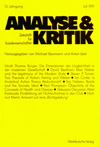ohne Titel

1984 (6) Issue 2
Editorial
Trotz ihrer disparaten Titel lassen sich die Beiträge in diesem Heft einem gemeinsamen Thema zuordnen: es geht um die Gültigkeit der einheitswissenschaftlichen These. Mit dieser These wird bekanntlich die Auffassung formuliert, daß es zwischen naturwissenschaftlichen und geistes- oder sozialwissenschaftlichen Methoden keinen grundsätzlichen Unterschied gibt, bzw. - normativ gewendet - keinen grundsätzlichen Unterschied geben soll. Ursprünglich wurde diese These nahezu selbstverständlich a...
Table of Contents
Title: Künstliche Intelligenz in den Sozialwissenschaften. Expertensysteme als Instrumente der Einstellungsforschung
Author: Michael Baurmann / Dieter Mans
Page: 103-159
Abstract: INTERDAT is computer software which substitutes a human interviewer. INTERDAT asks questions and tries to understand the responses by attributing mental models to the interviewee. The correctness of these models is tested by forecasting the responses to new questions. INTERDAT has many possibilities to adapt its models till it reaches the desired degree of understanding. Technologically INTERDAT is an Artificial Intelligence programme which is written entirely in LISP and to our knowledge the first AI application in sociological research.
Title: Deskriptions- und Interpretationsprobleme beim psychologischen Erklären
Author: Hans-Georg Bosshardt
Page: 160-189
Abstract: In this paper, the descriptive information contained in empirical laws is contrasted with common-sense descriptions of situations and behavior. According to the Hempel-Oppenheim-Schema, explanation is, essentially conceived as a matter of deductive reasoning in which the fact to be explained is subsumed under one (or more) empirically valid generalizations or laws. However, this kind of explanation is necessarily based on intuitive processes of diagnosis and interpretation. It is argued that these intuitive processes enable the scientist to formulate descriptive sentences which form the arguments of logically correct explanations. It is assumed that people produce common-sense descriptions of situation and behavior in correspondence with their subjective experience of other people's behavior and its determinants. In order to obtain intuitively adequate empirical generalizations and behavioral laws it is proposed that common-sense descriptions of behavior and situations should be integrated into the antcedent and / or consequent of laws. In such a research strategy the regularities between meaningfully interpreted situational and behavioral aspects can be studied.
Title: Ist die Unterscheidung von nomothetischen und idiographischen Wissenschaften noch zeitgemä ß?
Author: Rainer Thurnher
Page: 190-211
Abstract: This paper discusses C. G Hempel's contention according to which universal laws fulfil the same ,theoretical function, in natural and historical science. To this end, the author differentiates between systembuilding and genetically structured sciences. Their modes of presentation are respectively hierarchically ordered theory and narrative. These two basic ways of arranging our knowledge are led back to a difference in explanation, of a pragmatic, not logical nature, that is, to the difference between subsumtion and ascription. Whereas in the systematic organization of knowledge, the basic underlying theory sets the exact conditions, under which a fact can be described as explained, such an epistemological directive function of laws is not to be found in genetic organization.